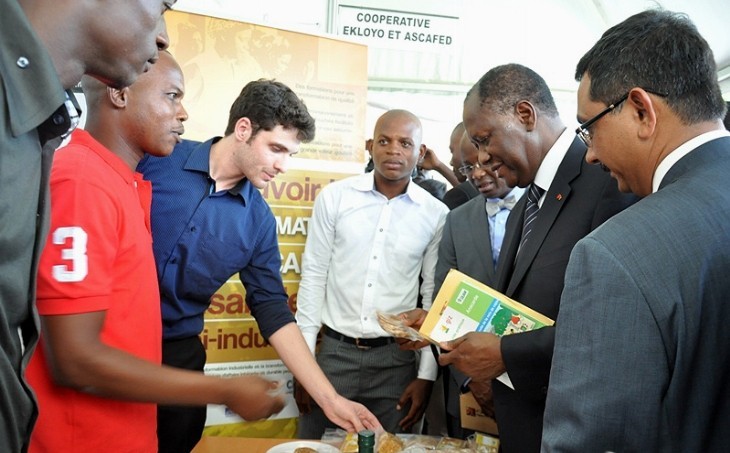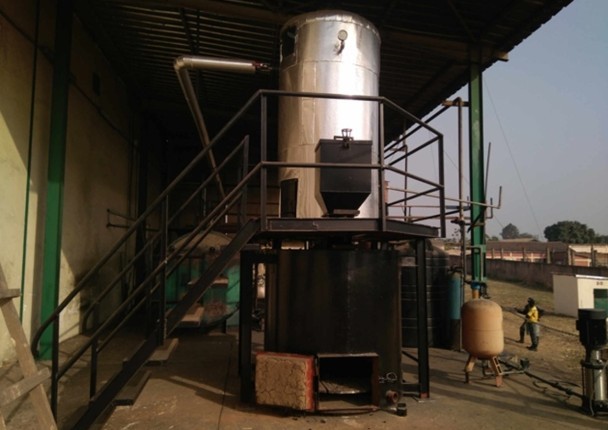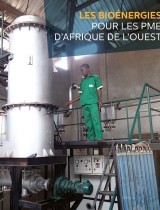BIOSTAR - Supplying sustainable bioenergy to agro-food SMEs in the Sahel
Partners
Main goals
Cashew nut, peanut, shea, nutshell rice husks, mango kernels: these residues produced by food sector SMEs are all potential sources of bioenergy. A sustainable energy option that CIRAD and nine of its partners - including Nitidæ - are planning to develop in West Africa through the BIOSTAR project, supported by the European Union and the Agence Française de Développement (French Development Agency).
BioStar Project website: www.biostar-afrique.org
Specific objectives
Improving energy supply to food processing SMEs thanks to bioenergy in the countries of the Sahel is the goal of the BIOSTAR project. Coordinated by CIRAD in collaboration with nine African and European partners – research and civil society –, it is part of the major European DeSIRA programme. Its five-year funding (2020-2024) is provided by the European Union and the Agence Française de Développement, with a total budget of more than 11 million euros .
Results
Activities
A potential energy source for local food sector SMEs
In West Africa, access to energy in rural areas is often erratic, expensive and insufficient. To secure energy supplies, agrifood processing SMEs are forced to set up in city suburbs. As a consequence, transporting raw materials from agricultural production areas generates extra costs and results in post-harvest losses. In addition, urban concentration is increasing, at the expense of rural areas, which are struggling to develop since their activity is consequently limited to agriculture.
These companies also generate organic waste that, if poorly managed, causes problems in terms of public health and safety and/or environmental contamination. Nevertheless, this biomass – cashew and shea nut shells, groundnut shells, mango kernels or rice husks – is a potential source of energy: heat, mechanical power and electricity. Hence the objective of BIOSTAR, in other words setting up bioenergy production units in food sector SMEs that are fed by their organic residues.
Success is conditioned by the quality of supply of organic residues
Starting this year, the project will focus on Senegal and Burkina Faso, where five agrifood sectors – cashew nut, groundnut, shea, mango and rice – have been identified. In collaboration with local interprofessional organizations, the project will look for SMEs that have the capacity to innovate and are representative of their sector in order to define with them their energy needs and to find solutions for a sustainable supply of residues. The latter point is crucial: in 2013 , a study conducted by CIRAD showed that in different countries, including Burkina Faso, the quality of supply conditioned the success or failure of bioenergy production systems in rural areas. Next, 16 prototypes of bioenergy production equipment will be adapted to the situation of each SME and installed by Sahelian or European suppliers. At the end of the project, the experimental units will be transferred to the SMEs. Finally, a training programme will be deployed in order to develop the bioenergy sector in Sahelian Africa, thanks in particular to the involvement of local, national and sub-regional policymakers. The goal of this process is to implement a policy framework that is more conducive to this development in rural areas.
More dynamic and energy-independent rural areas
Eventually, thanks to cheaper, stable energy, these SMEs will be able to relocate to rural areas, closer to the production of raw materials, which should have a domino effect. For companies, this means less transport and reduced post-harvest losses. Moreover, better preservation of processed products will contribute to food security for all actors in the chain, whether farmers or SME employees, who are often women. In other words, rural areas will become more energy-independent and dynamic. Finally, and more broadly, better management of these methane-producing residues and a reduction in the use of fossil fuels will help to reduce the sector’s impact on climate change.
Related people
Magloire Sacla Aïde
Design & Mechanical Engineer, specialised in "Energy and industrial technician in mechanical production" from the Ecole Polytechnique of Abomey Calavi (EPAC) in Benin, he brings his expertise in renewable energy including biomass energy recovery and industrial process
See moreJulia Artigas Sancho
Process engineer and holder of a European MsC in Renewable energies, she works on energy-related issues in African industry, since 2016. Process optimization and agri-waste-to-energy systems are her main expertise areas: appropriate technologies, training on operation and maintenance, biofuels…
See more
Wend-Yam Ruth Konkobo
She holds a CAP in accounting, a BEP in accounting and business administration, a BAC in G2 and a BAC+3 in Finance and Accounting from the Aube Nouvelle University in Bobo-Dioulasso. She brings her expertise in administrative and accounting management to the BioStar project. She has worked in several structures: stock manager of agricultural inputs at UNPCB, accountant at ECOGEB, commercial agent at Coris Banque and collection agent at LNSP
ELECTRICI - Recycling of cashew waste i…





